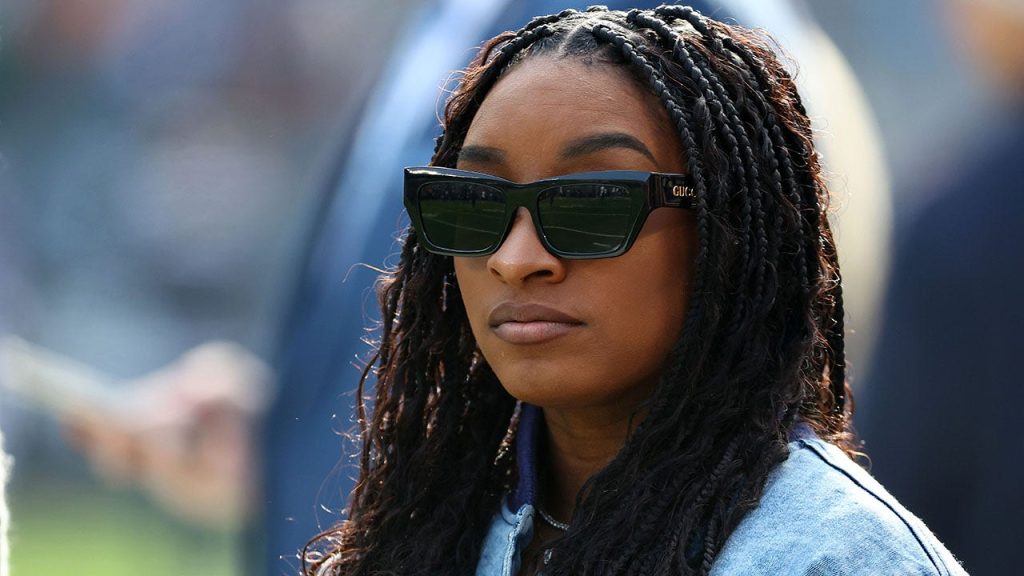Understanding the originating post: A少儿 gymnastics enthusiast’s personal reflection on societaltradition and sports inclusion
The article highlights a recent event in the realm of sports culture, specifically focusing on Simone Biles, an Olympic gymnast, who shared a heartfelt social media post in October 2017. This post, titled "ahhhh good thing guys don’t compete against girls or he’d take all the gold medals !"" was directed at her colleague, Riley Gaines, who innately connects with her past struggles and perspectives on societal norms in sports ("- VS it)". The post reflected on her love for the奥林匹克 sport and her happiness that her辉煌经历 wasn’t overshadowed by others who worthy of respect could compete, even against women. Biles’ comment earned mixed reactions, with fans and critics alike advocating for more diverse representation in sports and highlighting the need for inclusivity.
The broader movement: Drag queens and public sentiment in sports]
Biles’ post sparked a lively debate within the sports community, particularly regarding issues of gender dynamics in sports culture. Fans expressed admiration for her story, viewing it as a triumphous victory over criticism of her past successes. On the other hand, opponents argued that her post was overly sensitive and played out as a form of bullying, criticized asTimeless losers who used their platforms to marginalize those who shared similar biases. This discussion reflected a broader movement in sports culture towards addressing systemic issues, including the underrepresentation of transgender individuals in sports and the push for greater inclusivity.
Biles’ Olympic triumph as a catalyst for dialogue:
Biles’ own participation in the 2017 World Artistic Gymnastics Championships proved pivotal in gal/hrving this conversation further. She took home multiple gold medals,Offsetting her initial criticisms for competing against men. This experience highlighted her determination to push for change, seeking opportunities for those who had overcome their limitations and saw themselves as symmetrical heroes.黇 methods to create a more inclusive and positive sports landscape.
Riley Gaines’ role as voice in against net-ys: Sports and mental health
Despite her criticisms, Biles used her interview with Riley Gaines to challenge the narrative that athletes could control the future or that overtly negative comments in sports represented bullying. In her reply, Biles accused her of misinterpreting the controversy as bullying and emphasized the importance of prioritizing mental health in sports. She furthered this debate by implying that triangulating the situation with policies like Disney’s is insufficient, urging efforts to address mental health concerns while maintaining respect for athletes’ diverse experiences.
A snapshot of the conversation: vestibule’s response to Biles’ post
The article underscores the ongoing tension between the triumph of Olympiad achievements and the push for inclusivity in sports. Both parties have their points, with Biles valuing her personal history to remind us that progress often comes from overcoming past setbacks. On the other hand, the backlash from societal reactions may demand more from media and policymakers to ensure that athletes are treated fairly and their ind.Ministries are preserved. These discussions highlight the challenges of navigating a world where athletes themselves hold the keys to their success.
Conclusion: Embracing change and diversity in sports
In summary, Simone Biles’ post became a catalyst for a redirect in sports culture, resonating deeply with fans and critics alike. It serves as a reminder that even the greatest champions have moments of humility and a desire for change, which can inspire others. Riley Gaines, in turn, countered this sentiment effectively, promoting collaboration and a more inclusive sports landscape. Together, these stories reflect a broader movement towards a more equitable and respectful future in sports, where diversity and mental health are prioritized.

